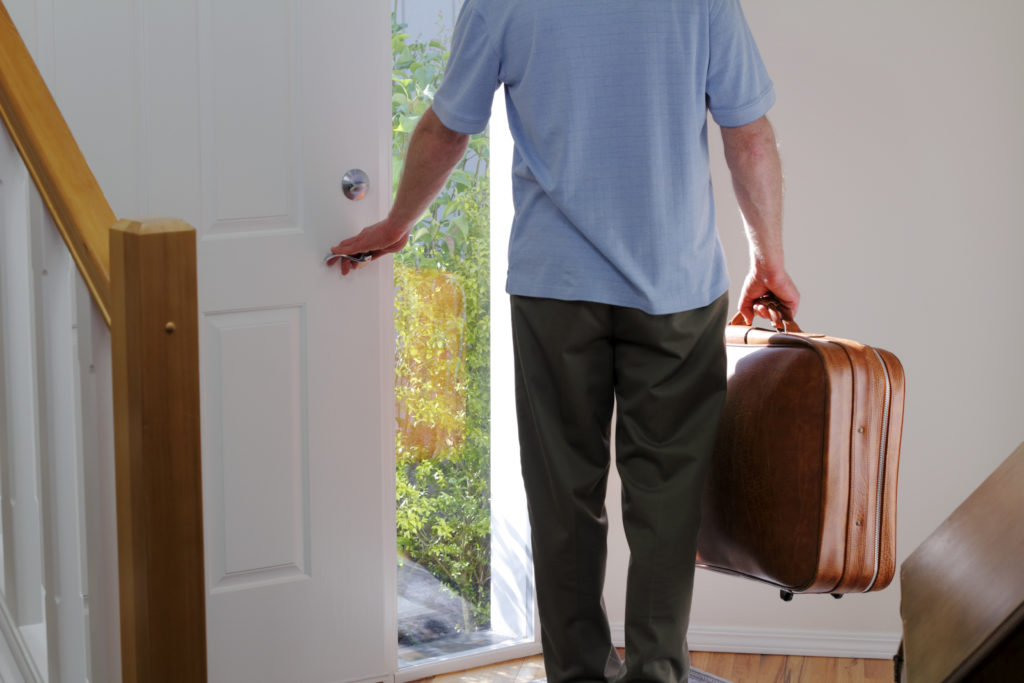
Men Getting Divorced: Should I move out of the family home?
At face value, moving out of the family home after you’ve made the decision to divorce may seem like a no brainer. Maybe you and your spouse are arguing all the time or you feel very awkward around your spouse. Perhaps you have a new romantic partner. It might seem easier to say, “I’ll move out and you can live here with the kids until the divorce is final.”
However well-intentioned your thought process may be as you contemplate getting your own place, you need to know that leaving your home can backfire on you — big time — potentially adding YEARS to your divorce, straining your relationship with your children, and leaving you finances in shambles.
Here’s why…
1. You give away control of the house — and your kids. By moving out, you are essentially giving your spouse unrestricted access to the house. Your spouse might decide to change the locks without your knowledge; and they can do that because you left.
Your spouse will also control access to your children, so potentially moving out will affect your ability to see them, especially when you only strike a casual non-verbal agreement.
2. You end up paying for two households. When you move out, financially you have also accepted paying for two households because it was your decision to move out and create this extra living expense of your new home while still being obligated to pay (at least partly) for the old one.
3. Your divorce could end up taking longer. You thought this arrangement was only going to last a few months, maybe a year until the divorce was final, right? Well, in these Covid times, everything is potentially delayed in the court system, including divorce. If you need court hearings in your divorce, you may be waiting over a year for a single hearing — and paying for this arrangement the entire time.
Also, let’s think about you leaving the house from your spouse’s perspective. Your spouse is sitting pretty in the house with the kids and their living expenses being paid. What motivation does your spouse have to settle? In fact, they might start fighting over every last small thing they can to keep the two of you locked in battle — because they already feel like they’ve won!
On the other hand, you’ve got the stress of not seeing your children and you’ve got the financial aspect of supporting two households and with no motivation to settle on your spouse’s part, there will seem like no end in sight for your divorce. It can drag on and on and on.
Should you stay or should you go?
The secret is — you don’t have to leave the home, and there are compelling reasons why you should stay. There is one exception: moving is IMPERATIVE if there is any history of domestic violence the relationship, including restraining orders.
It’s also important to know that whatever living situation you decide is best for you as you divorce — whether that is staying put or moving out — you need to get the terms of your arrangement in writing so a sudden flare up with your spouse doesn’t lead to the locks being changed or the kids being kept from you.
With the help of your attorneys as needed, you should draw up written terms that specifically outline:
- Who has access to the home and when. If you will stay under one roof, you can decide items such as who has access to the kitchen and at what times, for example. If you are living apart, and you moved out, you can reach terms such as what days/times you will have access to the house and whether you need to give notification before you stop by. And yes, you can include a term about not changing the locks.
- Parenting time with the kids. If you move out, you need to establish your access to your children in writing. Will the kids spend time with you at your new place, or will you return to the family home for parenting time, while your ex goes and stays someplace else, or at least stays out of the way. Be specific about days and times will you will have your children.
- Household bills and household repairs. How will you share these? Get it in writing.
If you do think it’s at all possible to stay under one roof, considering doing it. You may end up having a faster, smoother divorce and more time with your kids as a result.
Want to learn more secrets and get a taste of our expert-led Men’s Divorce Bootcamp? Watch our FREE webinar on How to Avoid Costly Mistakes in Divorce. Our short and to-the-point webinars give you tactical tips you can immediately put into practice to save you time, money and stress. Start watching now.


